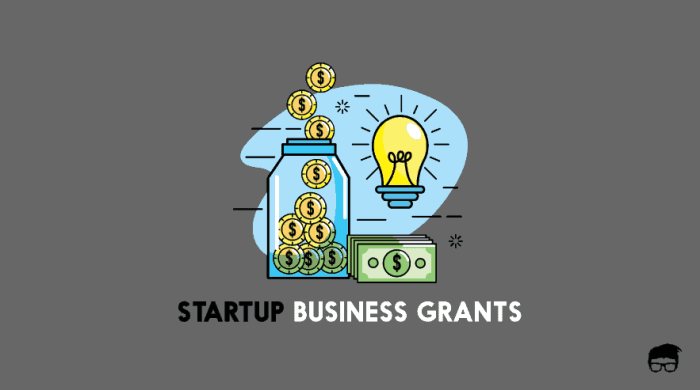Small business startup grants are a valuable resource for entrepreneurs looking to kickstart their ventures. From understanding what these grants entail to tips for maximizing success, this guide covers it all.
Exploring the eligibility criteria, application process, different types of grants, and strategies for success, this comprehensive overview will help you navigate the world of small business startup grants with confidence.
Understanding Small Business Startup Grants

Small business startup grants refer to financial assistance provided to entrepreneurs to help them launch or grow their small businesses. These grants are typically non-repayable and are aimed at supporting the development of new businesses in various industries.
Purpose of Small Business Startup Grants
Small business startup grants serve the purpose of fostering innovation, job creation, and economic growth by providing financial resources to individuals or groups with promising business ideas. These grants help reduce the financial barriers that often hinder entrepreneurs from starting their own businesses.
- Encouraging entrepreneurship and small business development
- Stimulating local economies
- Promoting diversity and innovation in business
Organizations Offering Small Business Startup Grants
There are various organizations, both government and private, that offer small business startup grants to eligible applicants. Some examples include:
1. Small Business Administration (SBA)
2. Economic Development Administration (EDA)
3. National Association for the Self-Employed (NASE)
4. Grants.gov
5. Local economic development agencies
Eligibility Criteria for Small Business Startup Grants
To qualify for small business startup grants, applicants must meet specific eligibility requirements set by the grant providers. Understanding these criteria is crucial to increase the chances of receiving funding for your new venture. Here are some typical eligibility requirements and tips on how to meet them effectively:
Legal Business Structure
Most small business startup grants require applicants to have a legal business structure in place, such as a sole proprietorship, partnership, limited liability company (LLC), or corporation. Make sure your business is registered and compliant with local regulations before applying for grants.
Business Plan
Grant providers often require applicants to submit a well-developed business plan outlining their goals, target market, financial projections, and marketing strategies. Ensure your business plan is comprehensive and demonstrates a clear roadmap for the success of your venture.
Financial Documentation
Applicants may need to provide financial documentation, such as income statements, balance sheets, and cash flow projections, to prove the viability of their business idea. Keep your financial records organized and up-to-date to support your grant application.
Eligible Industry or Sector
Some small business startup grants are specific to certain industries or sectors, such as technology, agriculture, or social enterprise. Make sure your business aligns with the grant’s focus area to qualify for funding.
Dealing with the aftermath of a road traffic accident can be overwhelming, but having a skilled road traffic accident lawyer on your side can make a significant difference in your case. They can provide you with the legal support and representation you need to navigate through the complexities of the legal system.
Eligible Demographic or Location
Certain grants may target entrepreneurs from underrepresented groups, such as women, minorities, or veterans, or businesses located in disadvantaged communities. Check the eligibility criteria to see if you meet any specific demographic or location requirements.
Application Process for Small Business Startup Grants
When applying for small business startup grants, it is essential to understand the steps involved, the required documentation, and how to craft a compelling grant proposal.
When you find yourself in a situation where you need legal assistance after a head-on collision, it’s crucial to seek the expertise of a head-on collision lawyer who can guide you through the process and help you get the compensation you deserve.
Steps for Applying for Small Business Startup Grants
- Research and identify potential grant opportunities relevant to your business.
- Review the eligibility criteria and guidelines provided by the grant provider.
- Prepare a detailed business plan outlining your business idea, goals, market analysis, and financial projections.
- Complete the grant application form accurately and provide all requested information.
- Submit the application within the specified deadline and follow up if necessary.
Documentation Needed During the Application Process
- A detailed business plan including market research, financial projections, and operational strategy.
- Proof of business registration and any required licenses or permits.
- Financial statements, tax returns, and other relevant financial documents.
- Resumes of key team members showcasing their qualifications and experience.
Writing a Compelling Grant Proposal
- Clearly state the purpose of your business and how the grant will help you achieve your goals.
- Highlight your unique selling proposition and what sets your business apart from competitors.
- Provide a detailed budget indicating how the grant funds will be used and the expected outcomes.
- Include any supporting documents or testimonials that strengthen your proposal.
Different Types of Small Business Startup Grants
When it comes to small business startup grants, there are various categories or types available to help entrepreneurs kickstart their ventures. These grants can be classified into government grants and private grants, each with its own set of pros and cons.
Government Grants vs Private Grants
Government Grants:
- Government grants are usually funded by taxpayer money and allocated by government agencies or departments.
- They often have strict eligibility criteria and require detailed documentation for application.
- Government grants can provide substantial funding and resources to startups without the need for repayment.
Private Grants:
- Private grants are typically funded by corporations, foundations, or nonprofit organizations.
- They may have more specific focus areas or industries they support compared to government grants.
- Private grants may offer more flexibility in terms of eligibility criteria and application processes.
It is essential to carefully evaluate the requirements and conditions of each type of grant to determine the best fit for your startup.
Pros and Cons of Different Types of Grants for Startups
| Government Grants | Private Grants |
|---|---|
| Pros: | Pros: |
| – Significant funding potential | – More flexibility in eligibility |
| – Resources and support from government agencies | – Specific focus areas for funding |
| – No repayment required | – Potential for networking opportunities |
| Cons: | Cons: |
| – Stringent eligibility criteria | – Limited funding compared to government grants |
| – Lengthy application processes | – Potential competition for grants |
Tips for Maximizing Success in Obtaining Small Business Startup Grants

Researching and identifying suitable grant opportunities is crucial for maximizing success in obtaining small business startup grants. Tailoring applications to specific grant requirements and finding ways to stand out can significantly increase the chances of grant approval.
Strategies for Researching and Identifying Suitable Grant Opportunities
- Utilize online resources such as government websites, grant databases, and business organizations to search for relevant grant opportunities.
- Attend workshops, seminars, and networking events to stay informed about new grant programs and connect with potential grant providers.
- Consult with business advisors, mentors, and industry experts to get insights on available grants that align with your business goals.
Guidance on Tailoring Applications to Specific Grant Requirements
- Carefully read and understand the eligibility criteria, objectives, and evaluation criteria of each grant program before preparing your application.
- Customize your business plan, budget, and proposal to address the specific goals and requirements Artikeld in the grant application guidelines.
- Highlight how your business aligns with the mission and priorities of the grant provider to demonstrate a strong fit for the funding opportunity.
Suggestions for Standing Out and Increasing Chances of Grant Approval
- Clearly articulate the unique value proposition of your business and how it addresses a pressing need or gap in the market.
- Showcase your passion, commitment, and expertise in your industry to convey credibility and inspire confidence in grant reviewers.
- Provide concrete examples, success stories, and data-driven evidence to support your claims and demonstrate the potential impact of funding on your business growth.
Final Wrap-Up: Small Business Startup Grants

In conclusion, small business startup grants can pave the way for your entrepreneurial dreams to become a reality. By leveraging the information provided in this guide, you can increase your chances of securing the funding needed to thrive in the competitive business landscape.